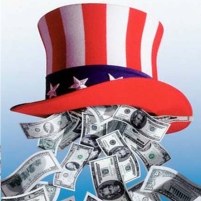Wall Street Firms Borrowed $156 Billion in One Day as Congress Debated Bailout
Monday, December 06, 2010

When the U.S. House of Representatives refused to pass the Bush administration’s bailout plan on September 29, 2008, Wall Street collectively gulped and, unbeknownst to the American public, ran to the bank. The bank in this case was the Federal Reserve, whose Primary Dealer Credit Facility (PDCF) dished out $155.8 billion in loans in a single day, the largest amount dispensed by the PDCF during the crisis that year. The PDCF was created just six months earlier to provide overnight loans to the big bankers after the panic that followed the collapse of Bear Stearns.
There were plenty of other heavy borrowing days that month before the 29th. On September 17, two days after Lehman Brothers failed and it was announced that Bank of America would buy out Merrill Lynch, the PDCF gave out more than $100 billion in loans, including $35 billion to Morgan Stanley, $20 billion to Merrill Lynch, $14 billion to Barclays PLC and $11 billion to Goldman Sachs.
There were more $100 billion days until the daily borrowing peaked on September 29. On that Monday alone, Morgan Stanley took $61 billion, Merrill Lynch $36 billion, Citigroup $15.5 billion Barclays and Goldman Sachs $15 billion each, Bank of America $8.3 billion and UBS $4.1 billion.
On October 1, 2008, the U.S. Senate passed a version of the bailout and President Bush signed it on October 3.
-David Wallechinsky, Noel Brinkerhoff
When Bailout Vote Failed, Banks Took $155.8 Billion from Fed Lending (by David Benoit, Dow Jones Newswires)
- Top Stories
- Unusual News
- Where is the Money Going?
- Controversies
- U.S. and the World
- Appointments and Resignations
- Latest News
- Musk and Trump Fire Members of Congress
- Trump Calls for Violent Street Demonstrations Against Himself
- Trump Changes Name of Republican Party
- The 2024 Election By the Numbers
- Bashar al-Assad—The Fall of a Rabid AntiSemite






Comments